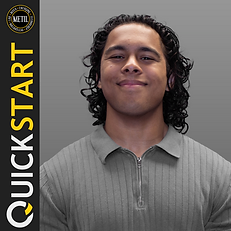




Aurela Broqi

Major: Computer Science
Graduation Year: Spring 2026
Internship Cohort: Summer 2025
Aurela Broqi is a Computer Science major, graduating May 2026, who interned with the Summer 2025 QuickStart program. She contributed to backend research for a shooting range simulation developed for the Department of Energy, where she helped document and break down the Scenario Complexity algorithm, which is a framework for quantifying training difficulty through task load, cognitive stressors, and decision-making complexity. She was responsible for analyzing training components, outlining how difficulty scales with user performance, and mapping out a basic workflow for how raw simulation data would be processed and interpreted.
In a separate project, also sponsored by the Department of Energy, she worked with Unreal Engine to enhance simulation hardware for a VR glovebox. Her contributions focused on defining expected glove interactions, troubleshooting movement inconsistencies, and ensuring the simulation accurately reflected physical behavior during a platform conversion.

Anthony Capponi

Major: Computer Science
Graduation Year: 2027
Anthony Capponi holds a Bachelor's degree in Computer Science from the University of Central Florida, where he collaborates with the Mixed and Emerging Technology Integration Lab (METIL). His research focuses on designing and prototyping human-computer interaction tools for next-generation interfaces.
He contributes to R&D initiatives with partners such as the U.S. Department of Energy, Avalon Holographics, and HaptX, developing real-time simulations, implementing AI-driven interfaces, and integrating haptic and holographic hardware. Notably, he has engineered Unity and Unreal environments for Steam and Vive VR, as well as holographic systems.
Anthony also designs tactile feedback systems utilizing HaptX and SenseGlove glove and motion tracking hardware. Furthermore, he has prototyped generative pipelines leveraging Large Language Models (LLMs) and 3D diffusion models like ChatGPT, Claude, Meshy, and Veo. Additionally, he builds real-time simulations and interaction logic for the Avalon holographic display table.
Anthony's work particularly interests the intersection of physical intuition, generative AI, and novel forms of interaction, an area that holds great significance to him.



Maya Couceiro

Major: Computer Science
Graduation Year: Fall 2025
Internship Cohort: Winterim 2024 & Summer 2025
Maya is a senior at the University of Central Florida pursuing a B.S. in Computer Science and is currently advancing toward her M.S. in Computer Science through the Accelerated B.S.-to-M.S. program. Her skillset centers on machine learning, programming, mathematics, and analytical problem-solving. During the Winterim QuickStart program, Maya engineered a real-time radiation modeling tool and warning system, enabling high-consequence response teams to visualize radiation zones based on isotope type and activity levels.
As part of her summer internship, Maya has helped implement a wildfire simulation for a proprietary volumetric (holographic) display table, enabling dynamic and immersive visualization. She is currently contributing to the Scenario Complexity project by dissecting and translating a mathematical formula into a format suitable for integration within software systems.

Scott Kuang

Major: Computer Science
Graduation Year: 2026
Internship Cohort: Winterim 2024 & Summer 2025
Scott Kuang is a senior undergraduate student at the University of Central Florida, pursuing a dual-degree Accelerated BS-to-MS program in computer science. His academic coursework encompasses areas such as quantum computing, cybersecurity, and software development. Scott interned at METIL during both Winterim and Summer periods, gaining hands-on experience with tools like Unity, augmented reality (AR), and haptic feedback systems.
As part of the QuickStart program, Scott presented Source Integrated Reality Channel (S.I.R.C.H.), a software tool designed to train first responders in prioritizing safety around radiation sources. By utilizing augmented reality, Bluetooth technologies, and the Unity game engine, mobile devices were transformed into real-world radiation sources, enhancing the training experience.
In Summer, Scott further explored immersive human-computer interactions by integrating vibrotactile gloves with 3D holographic projections as part of his team's research. The QuickStart program has been instrumental in fostering his professional growth, providing valuable mentorship that refined his creative problem-solving skills and empowered him to thrive in fast-paced, collaborative environments with cutting-edge technologies.

Henry Mack

Major: Mechanical Engineering
Graduation Year: 2028
Internship Cohort: Winterim 2024 & Summer 2025
Henry is a rising sophomore at the University of Central Florida (UCF), where he is studying mechanical engineering. His interests lie in robotics, combustion, modeling, and simulation. Henry is dedicated to exploring how these technologies can positively impact human training and everyday life. Over the Winterim, Henry worked on VH-CRIT, an immersive VR simulation designed to simulate the role of an emergency manager responding to a high-consequence nuclear threat. This project utilized generative AI and speech-to-text technology to create realistic training scenarios. During the summer period, he worked on H-GAIT, specifically designing environmental systems to increase complexity for the training simulation. Additionally, Henry created tools for content generation on the Wildfire Response Holo-Table demo.

Lee Marshall

Major: Computer Science
Graduation Year: 2026
Internship Cohort: Winterim 2024 & Summer 2025
Lee Marshall, a rising senior majoring in Computer Science with a specialization in Artificial Intelligence and Robotics, has successfully completed two notable projects during Winterim and summer internship. During Winterim, he worked on an AI system that removed hallucinations and developed another AI system capable of generating 3D models. In the summer, he designed simulations in Unity, incorporating virtual reality (VR) capabilities with haptic feedback gloves and automated decision-making systems utilizing AI.

Jeremy Myers

Major: Digital Media
Graduation Year: Spring 2025
As a graduate of the University of Central Florida with a degree in Digital Media, Jeremy brings expertise in game engines such as Unreal and Unity, programming, design, and problem-solving skills. His experience was further refined during the Winterim Quickstart program, where he contributed to the development of the VR Haptic gloves project. In this capacity, he streamlined asset pipeline integration and enhanced interaction feedback across both Unreal Engine and Unity.
In his summer internship, Jeremy began implementing the holographic display table project, creating test scenes in Unity for seamless integration into the table. He also successfully tested the use of multiplayer features, allowing users to join from other devices while maintaining a stable main scene on the table.

Emily Portales

Major: Computer Science
Graduation Year: Fall 2027
Internship Cohort: Winterim 2024 & Summer 2025
Emily is a Computer Science major expected to graduate in Fall 2027. As part of both the Winterim and Summer 2025 internship cohorts, Emily has gained hands-on experience in researching how wearables can help detect changes in someone's health and in immersive technology development. Theoretical research conducted by Emily during her Winterim internship analyzed past studies on smart rings used for health tracking. She explored the potential of using wearable data, such as longitudinal biomarkers like heart rate variability (HRV) and temperature changes, to assess early signs of radiation poisoning. Currently, Emily is working on integrating SenseGlove (haptic feedback gloves) into a Unity platform with a holographic table, focusing on creating interactive experiences that provide real-time feedback.



Armando Rodriguez

Major: Information Technology
Graduation Year: 2026
Internship Cohort: Winterim 2024 & Summer 2025
Armando Rodriguez is currently an Information Technology student at the University of Central Florida (UCF), focusing on cybersecurity. He is presently integrating and enhancing the performance of haptic feedback gloves within a Department of Energy training simulation. During his Winterim internship, he conducted research on a quantum-based cybersecurity failsafe utilizing local intranets and a silicon root of trust embedded into confidential servers for government facilities.